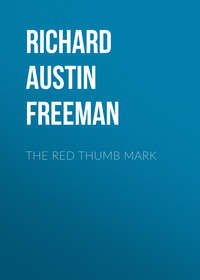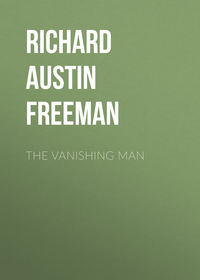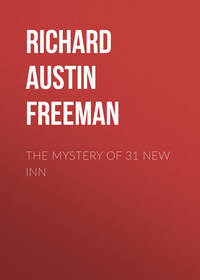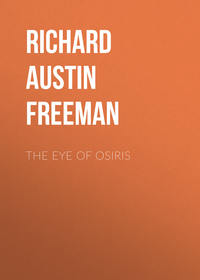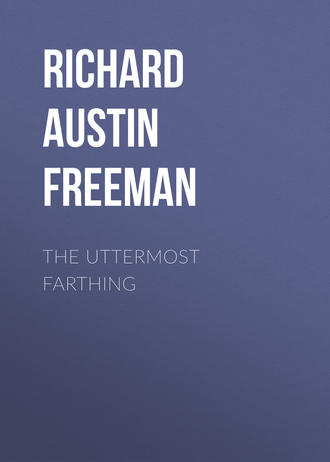 полная версия
полная версияThe Uttermost Farthing
"He was a careful operator. He turned over each piece thoroughly, weighing it in his hand and giving especial attention to the hall-mark. And, as I watched him, the thought came into my mind that, perchance, this was the very wretch who had murdered my wife, come back for the spoil that he had then had to abandon. It was quite possible, even likely, and at the thought I felt my cheeks flush and a strange, fierce pleasure, such as I had never felt before, swept into my consciousness. I could have laughed aloud, but I did not. Also, I could have knocked him down with perfect ease as he stood, but I did not. Why did I not? Was it a vague, sporting sense of fairness? Or was it a catlike instinct impelling me to play with my quarry? I cannot say. Only I know that the idea of dealing him a blow from behind did not attract me.
"Presently he shuffled away (in list slippers) to fetch a fresh cargo. Then some ferociously playful impulse led me to steal out of my hiding-place and gather up a number of spoons and forks, a salt-cellar, a candlestick and an entree-dish and retire again behind the screen. Then my friend returned with a fresh consignment; and as he was anxiously looking over the fresh pieces, I crept silently out at the other end of the screen, out of the open doorway and down the hall to the pantry. Here a lighted candle showed the plate-chest open and half empty, with a few pieces of plate on a side table. Quickly but silently I replaced in the chest the spoons and other pieces that I had collected, and then stole back to my place behind the screen and resumed my observations.
"My guest was quite absorbed in his task. He had a habit—common, I believe, among 'old lags'—of talking to himself; and very poor stuff his conversation was, though it was better than his arithmetic, as I gathered from his attempts to compute the weight of the booty. Anon, he retired for another consignment, and once more I came out and gathered up a little selection from his stock; and when he returned laden with spoil, I went off, as before, and put the articles back in the plate-chest.
"These manoeuvres were repeated a quite incredible number of times. The man must have been an abject blockhead, as I believe most professional criminals are. His lack of observation was astounding. It is true that he began to be surprised and rather bewildered. He even noted that 'there seemed a bloomin' lot of 'em;' and the quality of his arithmetical feats and his verbal enrichments became, alike, increasingly lurid. I believe he would have gone on until daylight if I had not tried him too often with a Queen Anne teapot. It was that teapot, with its conspicuous urn design, that finally disillusioned him. I had just returned from putting it back in the chest for the third time when he missed it; and he announced the discovery with a profusion of perfectly unnecessary and highly inappropriate adjectives.
"'Naa, then!' he exclaimed truculently, 'where's that blimy teapot gone to? Hay? I put that there teapot down inside that there hontry-dish—and where's the bloomin' hontry? Bust me if that ain't gone to!'
"He stood by the table scratching his bristly head and looking the picture of ludicrous bewilderment. I watched him and meanwhile debated whether or not I should take the opportunity to knock him down. That was undoubtedly the proper course. But I could not bring myself to do it. A spirit of wild mischief possessed me; a strange, unnatural buoyancy and fierce playfulness that impelled me to play insane, fantastic tricks. It was a singular phenomenon. I seemed suddenly to have made the acquaintance of a hitherto unknown moiety of a dual personality.
"The burglar stood awhile, muttering idiotically, and then shuffled off to the pantry. I followed him out into the dark hall and, taking my stand behind a curtain, awaited his return. He came back presently, and, by the glimmer of light from the open door, I could see that he had the teapot and the 'hontry.' Now some previous tenant had fitted the dining-room door with two external bolts; I cannot imagine why; but the present circumstances suggested a use for them. As soon as the burglar was inside, I crept forward and quietly shut the door, shooting the top bolt.
"That roused my friend. He rushed at the door and shook it like a madman; he cursed with incredible fluency and addressed me in terms which it would be inadequate to describe as rude. Then I silently shot the bottom bolt and noisily drew back the top one. He thought I had unbolted the door, and when he found that I had not, his language became indescribable.
"There was a second door to the dining-room also opening into the hall at the farther end. My captive seemed suddenly to remember this, for he made a rush for it. But so did I; and, the hall being unobstructed by furniture, I got there first and shot the top bolt. He wrenched frantically at the handle and addressed me with strange and unseemly epithets. I repeated the manoeuvre of pretending to unbolt the door, and smiled as I heard him literally dancing with frenzy inside. It seemed highly amusing at the time, though now, viewed retrospectively, it looks merely silly.
"Quite suddenly his efforts ceased and I heard him shuffle away. I returned to the other door, but he made no fresh attempt on it. I listened, and hearing no sound, bethought me of the open door of the museum. Probably he had gone there to look for a way out. This would never do. The plate I cared not a fig for, but the museum specimens were a different matter; and he might damage them from sheer malice.
"I unbolted the door, entered and shut it again, locking it on the inside and dropping the key into my pocket. I had just done so when he appeared at the museum door, eyeing me warily and unobtrusively slipping a knuckle-duster on his left hand. I had noted that he was not left-handed and drew my own conclusions as to what he meant to do with his right. We stood for some seconds facing each other and then he began to edge towards the door. I drew aside to let him pass and he ran to the door and turned the handle. When he found the door locked he was furious. He advanced threateningly with his left hand clenched, but then drew back. Apparently, my smiling exterior, coupled with my previous conduct, daunted him. I think he took me for a lunatic; in fact, he hinted as much in coarse, ill-chosen terms. But his vocabulary was very limited, though quaint.
"We exchanged a few remarks and I could see that he did not like the tone of mine. The fact is that the sight of the knuckle-duster had changed my mood. I no longer felt playful. He had recalled me to my original purpose. He expressed a wish to leave the house and to know 'what my game was.' I replied that he was my game and that I believed that I had bagged him, whereupon he rushed at me and aimed a vicious blow at my head with his armed left fist, which, if it had come home, would have stretched me senseless. But it did not. I guarded it easily and countered him so that he staggered back gasping.
"That made him furious. He came at me like a wild beast, with his mouth open and his armed fist flourished aloft as if he would annihilate me. I tried to deal with him by the methods of Mr. Slimy Cohen, but it was useless. He was no boxer and he had a knuckle-duster. Consequently we grabbed one another like a pair of monkeys and sought to inflict unorthodox injuries. He struggled and writhed and growled and kicked and even tried to bite; while I kept, as far as I could, control of his wrists and waited my opportunity. It was a most undignified affair. We staggered to and fro, clawing at one another; we gyrated round the room in a wild, unseemly waltz; we knocked over the chairs, we bumped against the table, we banged each other's heads against the walls; and all the time, as my adversary growled and showed his teeth like a savage dog, I was sensible of a strange feeling of physical enjoyment such as one might experience in some strenuous game. I seemed to have acquired a new and unfamiliar personality.
"But the knuckle-duster was a complication; for it was his right hand that I had to watch; and yet I could not afford to free for an instant his left, armed as it was with that shabbiest of weapons. Hence I hung on to his wrists while he struggled to wrench them free, and we pulled one another backwards and forwards and round and round in the most absurd and amateurish manner, each trying to trip the other up and failing at every attempt. At last, in the course of our gyrations, we bumped through the open door into the passage leading to the museum; and here we came down together with a crash that shook the house.
"As ill luck would have it, I was underneath; but, in spite of the shock of the fall, I still managed to keep hold of his wrists, though I had some trouble to prevent him from biting my hands and face. So our position was substantially unchanged, and we were still wriggling chaotically when a hasty step was heard descending the stairs. The burglar paused for an instant to listen and then, with a sudden effort, wrenched away his right hand, which flew to his hip-pocket and came out grasping a small revolver. Instantly I struck up with my left and caught him a smart blow under the chin, which dislodged him; and as he rolled over there was a flash and a report, accompanied by the shattering of glass and followed immediately by the slamming of the street door. I let go his left hand, and, rising to my knees, grabbed the revolver with my own left, while, with my right, I whisked out the concussor and aimed a vigorous blow at the top of his head. The padded weight came down without a sound—excepting the click of his teeth—and the effect was instantaneous. I rose, breathing quickly and eminently satisfied with the efficiency of my implement until I noticed that the unconscious man was bleeding slightly from the ear; which told me that I had struck too hard and fractured the base of the skull.
"However, my immediate purpose was to ascertain whether this was or was not the man whom I wanted. In the passage it was too dark to see either his finger-tips or the minute texture of his hair; but my candle-lamp, with its parabolic reflector, would give ample light. I ran through into the museum, where it was still burning, and, catching it up, ran back with it; but I had barely reached the prostrate figure when I heard someone noisily opening the street door with a latch-key. The charwoman had returned, no doubt, with the police.
"I am rather obscure as to what I meant to do. I think I had no definitely-formed intentions but acted more or less automatically, impelled by the desire to identify the burglar. What I did was to close the museum door very quietly, with the aid of the key, unlock the dining-room door and open it.
"A police sergeant, a constable and a plain-clothes officer entered and the charwoman lurked in the dark background.
"'Have they got away?' the sergeant demanded.
"'There was only one,' I said.
"At this the officers bustled away and I heard them descending to the basement. The charwoman came in and looked gloatingly at my battered countenance, which bore memorials of every projecting corner of the room.
"'It's a pity you come down, sir,' said she. 'You might have been murdered same as what your poor lady was. It's better to let them sort of people alone. That's what I say. Let 'em alone and they'll go home, as the sayin' is.'
"There was considerable truth in these observations, especially the last. I acknowledged it vaguely, while the woman cast fascinated glances round the disordered room. Then two of the officers returned and took up the enquiry to an accompaniment of distant police whistles from the back of the house.
"'I needn't ask if you saw the man,' said the plain-clothes officer, with a faint grin.
"'No, you're right,' said the sergeant. 'He set upon you properly, sir. Seems to have been a lively party.' He glanced round the room and added: 'Fired a pistol, too, your housekeeper tells me.'
"I nodded at the shattered mirror but made no comment, and the officer, remarking that I 'seemed a bit shaken up,' proceeded with his investigations. I watched the two men listlessly. I was not much interested in them. I was thinking of the man on the other side of the museum door and wondering if he had ringed hair.
"Presently the plain-clothes officer made a discovery. 'Hallo,' said he, 'here's a carpet bag.' He drew it out from under the table and hoisted it up under the gaslight to examine it; and then he burst into a loud and cheerful laugh.
"'What's up?' said the sergeant.
"'Why, it's Jimmy Archer's bag.'
"'No!'
"'Fact. He showed it to me himself. It was given to him by the 'Discharged Prisoners' Aid Society' to carry his tools in. Ha! Ha! O Lord!'
"The sergeant examined the bag with an appreciative grin, which broadened as his colleague lifted out a brace, a pad of bits, a folding jimmy and a few other trifles. I made a mental note of the burglar's name, and then my interest languished again. The two officers looked over the room together, tried the museum door and noted that it had not been tampered with; turned over the plate and admonished me on the folly of leaving it so accessible; and finally departed with the promise to bring a detective-inspector in the morning, and meanwhile to leave a constable to guard the house.
"I would gladly have dispensed with that constable, especially as he settled himself in the dining-room and seemed disposed to converse, which I was not. His presence shut me off from the museum. I could not open the door, for the burglar was lying just inside. It was extremely annoying. I wanted to make sure that the man was really dead, and, especially, I wanted to examine his hair and to compare his finger-prints with the set that I had in the museum. However, it could not be helped. Eventually I took my candle-lamp from the sideboard and went up to bed, leaving the constable seated in the easy-chair with a box of cigars, a decanter of whiskey and a siphon of Apollinaris at his elbow.
"I remained awake a long time cogitating on the situation. Was the man whom I had captured the right man? Had I accomplished my task, and was I now at liberty to 'determine,' as the lawyers say, the lease of my ruined life? That was a question which the morning light would answer; and meanwhile one thing was clear: I had fairly committed myself to the disposal of the dead burglar. I could not produce the body now; I should have to get rid of it as best I could.
"Of course, the problem presented no difficulty. There was a fire-clay furnace in the laboratory in which I had been accustomed to consume the bulky refuse of my preparations. A hundredweight or so of anthracite would turn the body into undistinguishable ash; and yet—well, it seemed a wasteful thing to do. I have always been rather opposed to cremation, to the wanton destruction of valuable anatomical material. And now I was actually proposing, myself, to practice that which I had so strongly deprecated. I reflected. Here was a specimen delivered at my very door, nay, into the very precincts of my laboratory. Why should I destroy it? Could I not turn it to some useful account in the advancement of science?
"I turned this question over at length. Here was a specimen. But a specimen of what? I am no mere curio-monger, no collector of frivolous and unmeaning trifles. A specimen must illustrate some truth. Now what truth did this specimen illustrate? The question, thus stated, brought forth its own answer in a flash.
"Criminal anthropology is practically an unillustrated science. A few paltry photographs, a few mouldering skulls of forgotten delinquents (such as that of Charlotte Corday), form the entire material on which criminal anthropologists base their unsatisfactory generalizations. But here was a really authentic specimen with a traceable life-history. It ought not to be lost to science. And it should not be.
"Presently my thoughts took a new turn. I had been deeply interested in the account that I had read of the ingenious method by which the Mundurucús used to preserve the heads of their slain enemies. The book was unfortunately still in the museum, but I had read the account through, and now recalled it. The Mundurucú warrior, when he had killed an enemy, cut off his head with a broad bamboo knife and proceeded to preserve it thus: First he soaked it for a time in some non-oxidizable vegetable oil; then he extracted the bone and the bulk of the muscles somewhat as a bird-stuffer extracts the body from the skin. He then filled up the cavity with hot pebbles and hung the preparation up to dry.
"By repeating the latter process many times, a gradual and symmetrical shrinkage was produced until the head had dwindled to the size of a man's fist or even smaller, leaving the features, however, practically unaltered. Finally he decorated the little head with bright-colored feathers—the Mundurucús were very clever at feather work—and fastened the lips together with a string, by which the head was suspended from the eaves of his hut or from the beams of the council house.
"It was highly ingenious. The question was whether heads so preserved would be of any use for the study of facial characters. I had intended to get a dead monkey from Jamrach's and experiment in the process. But now it seemed that the monkey would be unnecessary if only the preparation could be produced without injuring the skull; and I had no doubt that, with due care and skill, it could.
"At daybreak I went down to the dining-room. The policeman was dozing in his chair; there was a good deal of cigar-ash about, and the whiskey-decanter was less full than it had been, though not unreasonably so. I roused up the officer and dismissed him with a final cigar and what he called an 'eye-opener'—about two fluid-ounces. When he had gone I let myself into the museum lobby. The burglar was quite dead and beginning to stiffen. That was satisfactory; but was he the right man? I snipped off a little tuft of hair and carried it to the laboratory where the microscope stood on the bench under its bell-glass. I laid one or two hairs on a slide with a drop of glycerine and placed the slide on the stage of the microscope. Now was the critical moment. I applied my eye to the instrument and brought the objective into focus.
"Alas! The hairs were uniformly colored with brown pigment! He was the wrong man.
"It was very disappointing. I really need not have killed him, though under the circumstances there was nothing to regret on that score. He would not have died in vain. Alive he was merely a nuisance and a danger to the community, whereas in the form of museum preparations he might be of considerable public utility.
"Under the main bench in the laboratory was a long cupboard containing a large zinc-lined box or tank in which I had been accustomed to keep the specimens which were in process of preparation. I brought the burglar into the laboratory and deposited him in the tank, shutting the air-tight lid and securing it with a padlock. For further security I locked the cupboard, and, when I had washed the floor of the lobby and dried it with methylated spirit, all traces of the previous night's activities were obliterated. If the police wanted to look over the museum and laboratory, they were now quite at liberty to do so.
"I have mentioned that, during the actual capture of this burglar, I seemed to develop an entirely alien personality. But the change was only temporary, and I had now fully recovered my normal temperament, which is that of a careful, methodical and eminently cautious man. Hence, as I took my breakfast and planned out my procedure, an important fact made itself evident. I should presently have in my museum a human skeleton which I should have acquired in a manner not recognized by social conventions or even by law. Now, if I could place myself in a position to account for that skeleton in a simple and ordinary way, it might, in the future, save inconvenient explanations.
"I decided to take the necessary measures without delay, and accordingly, after a rather tedious interview with the detective-inspector (whom I showed over the entire house, including the museum and laboratory), I took a cab to Great St. Andrew Street, Seven Dials, where resided a well-known dealer in osteology. I did not, of course, inform him that I had come to buy an understudy for a deceased burglar. I merely asked for an articulated skeleton, to stand and not to hang (hanging involves an unsightly suspension ring attached to the skull). I looked over his stock with a steel measuring-tape in my hand, for a skeleton of about the right size—sixty-three inches—but I did not mention that size was a special object. I told him that I wished for one that would illustrate racial characters, at which he smiled—as well he might, knowing that his skeletons were mostly built up of assorted bones of unknown origin.
"I selected a suitable skeleton, paid for it, (five pounds) and took care to have a properly drawn invoice, describing the goods and duly dated and receipted. I did not take my purchase away with me; but it arrived the same day, in a funeral box, which the detective-inspector, who happened to be in the house at the time, kindly assisted me to unpack.
"My next proceeding was to take a set of photographs of the deceased, including three views of the face, a separate photograph of each ear, and two aspects of the hands. I also took a complete set of finger-prints. Then I was ready to commence operations in earnest."
The rest of Challoner's narrative relating to Number One is of a highly technical character and not very well suited to the taste of lay readers. The final result will be understood by the following quotation from the museum catalogue:
"Specimens Illustrating Criminal Anthropology.
"Series A. Osteology.
"1. Skeleton of burglar, aged 37. ♂. Height 63 inches. (James Archer.)
"This specimen was of English parentage, was a professional burglar, a confirmed recidivist, and—since he habitually carried fire-arms—a potential homicide. His general intelligence appears to have been of a low order, his manual skill very imperfect (he was a gas-fitter by trade but never regularly employed). He was nearly illiterate and occasionally but not chronically alcoholic.
"Cranial capacity 1594 cc. Cephalic index 76.8.
"For finger-prints see Album D 1, p. 1. For facial characters see Album E 1, pp. 1, 2 and 3, and Series B (dry, reduced preparations). Number 1."
I closed the two volumes—the Catalogue and the Archives—and meditated on the amazing story that they told in their unemotional, matter-of-fact style. Was poor Challoner mad? Had he an insane obsession on the subject of crime and criminals? Or was he, perchance, abnormally sane, if I may use the expression? That his outlook was not as other men's was obvious. Was it a rational outlook or that of a lunatic?
I cannot answer the question. Perhaps a further study of his Archives may throw some fresh light on it.
III
THE HOUSEMAID'S FOLLOWERS
The contrast in effect between suspicion and certainty is very curious to observe. When I had walked through the private museum of my poor friend Challoner and had looked at the large collection of human skeletons that it contained, a suspicion that there was something queer about those skeletons had made me quite uncomfortable. Now, after reading his first narrative, I knew all about them. They were the relics of criminals whom he had taken red-handed and preserved for the instruction of posterity. Thus were my utmost suspicions verified, and yet, strange as it may seem, with the advent of certainty, my horror of them vanished. Even the hideous little doll-like heads induced but a passing shudder. Vague, half superstitious awe gave place to scientific interest.
I took an early opportunity of renewing my acquaintance with the astonishing and gruesome "Museum Archives." The second narrative was headed "Anthropological Series, 2, 3 and 4." It exhibited the same singular outlook as the first, showing that to Challoner the criminal had not appeared to be a human being at all, but merely a sub-human form, anatomically similar to man.
"The acquisition of Specimen Number One," it began, "gave me considerable occupation, both bodily and mental. As I labored from day to day rendering the osseous framework of the late James Archer fit for exhibition in a museum case, I reflected on the future to which recent events had committed me. I had been, as it were, swept away on the tide of circumstance. The death of this person had occurred by an inadvertence, and accident had thrown on me the onus of disposing of the remains. I had solved that difficulty by converting the deceased into a museum specimen. So far, well, but what of the future?


